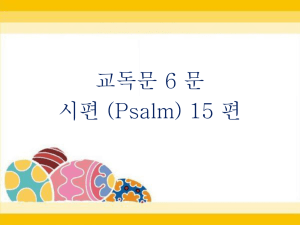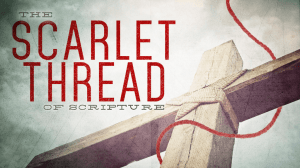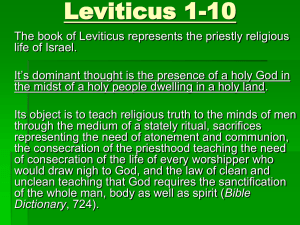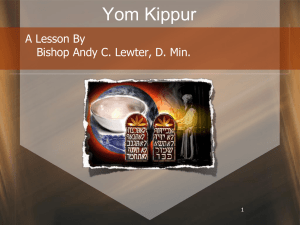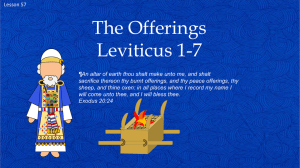power point slides
advertisement
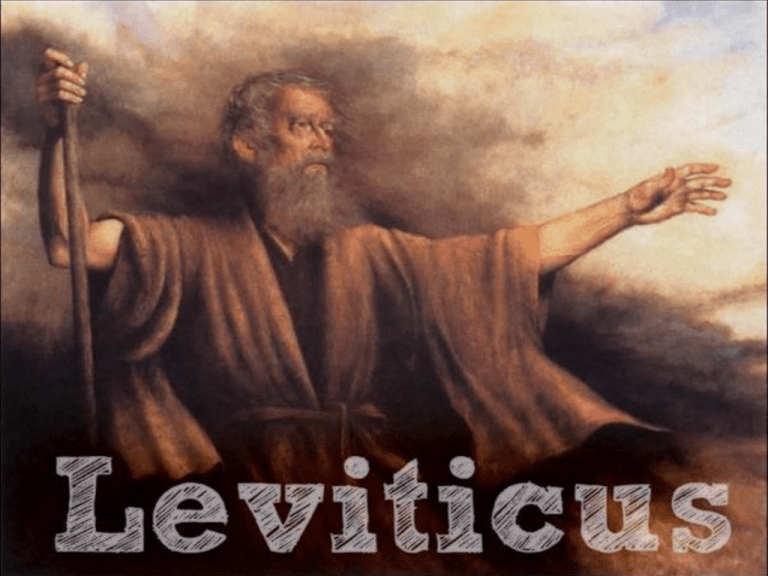
Abraham Moses Creation of world 2000 B.C. 1400 B.C.. 30 A.D. 2000 A.D. Books 3 – LEVITICUS NAME: “concerning the Levites” AUTHOR: Moses DATE: 1446 – 1406 THEME: Worship and Holiness What does it mean to LIVE as God’s Holy People? SETTING: Leviticus takes place within the two years that Israel spent camped at the foot of Mt. Sinai. Leviticus continues the story of Israel receiving God’s instructions at Sinai. IMPORTANT TOPICS: Sacrifice and God’s Grace; Role of the Priests; Purity; The Day of Atonement; and Holy Living. ATONEMENT William Tyndale the sixteenthcentury English Bible Translator, invented this word to express what Jesus accomplished on the cross: the cancellation of sins and reconciliation of God with humanity. The word has two parts: ”at” and “onement”. Atonement is God’s way to bring reconciliation and restoration to the world over sin! SACRIFICAL SYSTEM • Sin is what separates us from GOD • God commanded His people to make offerings and sacrifices to atone for their sins. • Each sacrifice had specific purposes and actions depending on the particular person and need. • There are 5 major sacrifices outlined within the book of Leviticus and One Major Day Leviticus 1 – 7 Burnt Offering Grain Offering Fellowship Offering Sin Offering Guilt Offering Priestly Instructions Burnt Offering • A burnt offering from the herd, the flock, or birds • Without blemish; the animal had to be perfect (sinless by Jesus) • Brought to the Tent of Meeting • Given to the priests to be burnt on the altar Burnt Offering - The Fat (v. 8) The “fat” see verse 8; Many pagan religions believed that an animal’s power and strength were found in the fat and blood once the animal was sacrificed to their deities. To overturn this God reserved the fat for himself and the blood for Atonement. An Israelite could not eat the fat or drink the blood or they would be cut off from the community! Pleasing Aroma to YAHWEH (v. 9, 13, 17) This signified God’s acceptance of the offering and, therefore, acceptance of the one making the offering. Unlike pagan deities, God offers forgiveness. Grain Offering • A grain offering shall be an offering to the LORD of fine flour bread • Pour oil on it and put frankincense on it • Brought to Aaron’s sons the priests • They would burn a portion and keep a portion Grain Offering • Leavening agents were associated with sin, decay, corruption, sickness, and even death. • All baked items offered to God as a grain offering were unleavened. • The bread of the Passover meal was also unleavened. Salt of the Covenant (v. 13) • Salt was produced by drying seawater from mineral deposits • Salt preserves, so it reminded the Israelites that God would preserve His covenant with Abraham, including the messianic promise the through Abraham all the families of the earth Peace Offerings • To be offered to the LORD an animal from the herd, flock, or a goat • Without blemish • It is a food offering with a pleasing aroma to the LORD • Given on high holy days and special occasions • God provides meat for a sacrificial banquet, which a family could share with invited guests • Peace offerings acknowledge God’s grace to his people Sin Offerings • Unintentional Sin by an Anointed Priest (4:1) • Unintentional Sin by the Whole Congregation (4:13) • Unintentional Sin by a Leader (4:22) • Unintentional Sin by Common People (4:27) Sin Offerings • Anointed Priest – A bull from the herd • Whole Congregation – A bull from the herd • Leader – A male goat without blemish • Common People – a goat, a female without blemish, a female lamb without blemish And the priest shall burn it on the altar for a pleasing aroma to the LORD. And the priest shall make atonement for him, and he shall be forgiven. (4:28) Graded Sin Offerings • Failure to respond to a public oath to testify (5:1) • Touching an unclean thing (5:2) • Touching human uncleanness (5:3) • Uttering a careless oath (5:4) Guilt Offerings • Sacrifices and compensations of the guilt offering for mending relationships with God and with neighbor. • Breach of faith regarding the holy things (5:14) • Doing things that by the Lord’s commandments ought not to be done (5:17) Guilt Offerings • Breach of faith against the LORD by deceiving his neighbor in a matter of deposit or security, or through robbery, or if he oppressed by his neighbor or has found something lost and lied about it, swearing falsely—in any of all the things that people do and sin (6:1 - 5) Guilt Offerings • Restore what has been took and add a fifth to it • He shall bring to the priest as his compensation to the LORD a ram without blemish • The priest shall make atonement for him before the LORD, and he shall be forgiven for any of the things have been done. Therefore since we have a great High Priest (Jesus the Son of God) who has gone through the heavens, let us hold firmly to the faith we profess. For we do not have a high priest who is unable to understand us. Why? Because he has been tempted in every way but has no sin. (Hebrews 4:14-16) Now Nadab and Abihu, the sons of Aaron, each took his censer and put fire in it and laid incense on it, and offered unauthorized fire before the Lord, which he had not commanded them. And fire came out from the Lord and consumed them, and they died before the Lord. (Numbers 10:1 – 2) 2x in chapter 11 we are reminded to “be holy, for I am holy.” v. 44 – For I am the LORD your God v. 45 – For I brought you out of Egypt. For I am the LORD your God… This covenant phrase appears 45 times from here to the end of Leviticus. It serves as a reminder to the Israelites that YAHWEH had distinguished Israel from other nations (20:24), that He might sanctify the chosen people (20:8; 21:8) and be their God.






